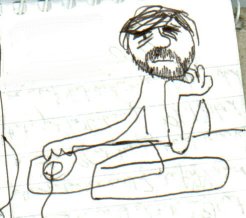secretGeek now syndicated!
secretGeek is now available via RSS. Whether or not my dodgy RSS hack will continue to work (for how long I don't know) ... But it works okay for me.
Outputing RSS has turned out to be a very easy process. I'm not sure if I've got the right version, etc.
Just cross fingers and hope it keeps working. It does for now:
Next thing is to move existing content into the Rss file. And to make my rapid blog page RSS aware, too.
Here are the ASP functions I use for outputting the RSS:
Public Sub SaveRSSItem(RSSItem, sFilename)
Dim filesys, readfile, sFileContents
set filesys=CreateObject("Scripting.FileSystemObject")
set readfile = filesys.OpenTextFile(sFileName, 1, false)
sFileContents = readfile.readall
readfile.close
sFileContents = replace(sFileContents, "", RSSItem)
set readfile = filesys.OpenTextFile(sFilename, 2, false)
readfile.write(sFileContents)
readfile.close
End Sub
Public Function MakeRssItem(sTitle, sLink, sDescription)
Dim rss
sLink = "https://secretgeek.net/" & sLink
rss = "" & vbcrlf
rss = rss & "- " & vbcrlf
rss = rss & "
" & sTitle & " " & vbcrlf
rss = rss & " " & sLink & "" & vbcrlf
rss = rss & " " & _
vbCrlf & " " & _
vbcrlf & " " & vbcrlf
rss = rss & " " & _
RFC1123Date(DateAdd("h", 5, Now)) & " " & vbcrlf
rss = rss & " Leon Bambrick " & _
vbcrlf
rss = rss & " " & sLink & " " & vbcrlf
rss = rss & " "
MakeRssItem = rss
End Function
Function RFC1123Date(dateSpec)
Dim astrDay
Dim astrNum
Dim astrMonth
astrDay = Array("Sun", "Mon", "Tue", "Wed", "Thu", "Fri", "Sat")
astrNum = Array( "00", _
"01", "02", "03", "04", "05", "06", "07", "08", "09", "10", _
"11", "12", "13", "14", "15", "16", "17", "18", "19", "20", _
"21", "22", "23", "24", "25", "26", "27", "28", "29", "30", _
"31", "32", "33", "34", "35", "36", "37", "38", "39", "40", _
"41", "42", "43", "44", "45", "46", "47", "48", "49", "50", _
"51", "52", "53", "54", "55", "56", "57", "58", "59", "60")
astrMonth = Array("Jan", "Feb", "Mar", "Apr", "May", "Jun", _
"Jul", "Aug", "Sep", "Oct", "Nov", "Dec")
RFC1123Date = astrDay(WeekDay(dateSpec) - 1) & ", " & astrNum(Day(dateSpec)) _
& " " & astrMonth(Month(dateSpec) - 1) & " " & Year(dateSpec) _
& " " & astrNum(Hour(dateSpec)) & ":" & astrNum(Minute(dateSpec)) _
& ":" & astrNum(Second(dateSpec)) & " GMT"
End Function



 font, single-spaced on pink paper. For action manuscripts, try IMPACT font, all capitals, in red ink. That will reach out, grab them by the collar and say "Hey buddy! You'd better pay damn good attention to this book! It's a ripper!"
font, single-spaced on pink paper. For action manuscripts, try IMPACT font, all capitals, in red ink. That will reach out, grab them by the collar and say "Hey buddy! You'd better pay damn good attention to this book! It's a ripper!"